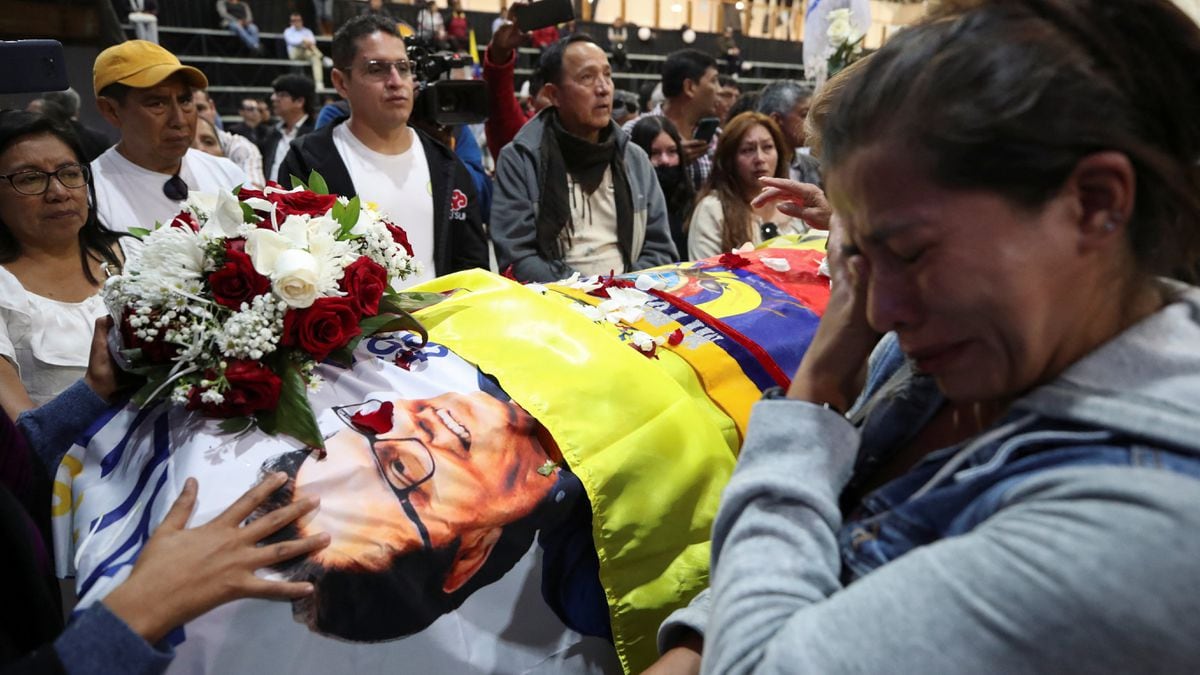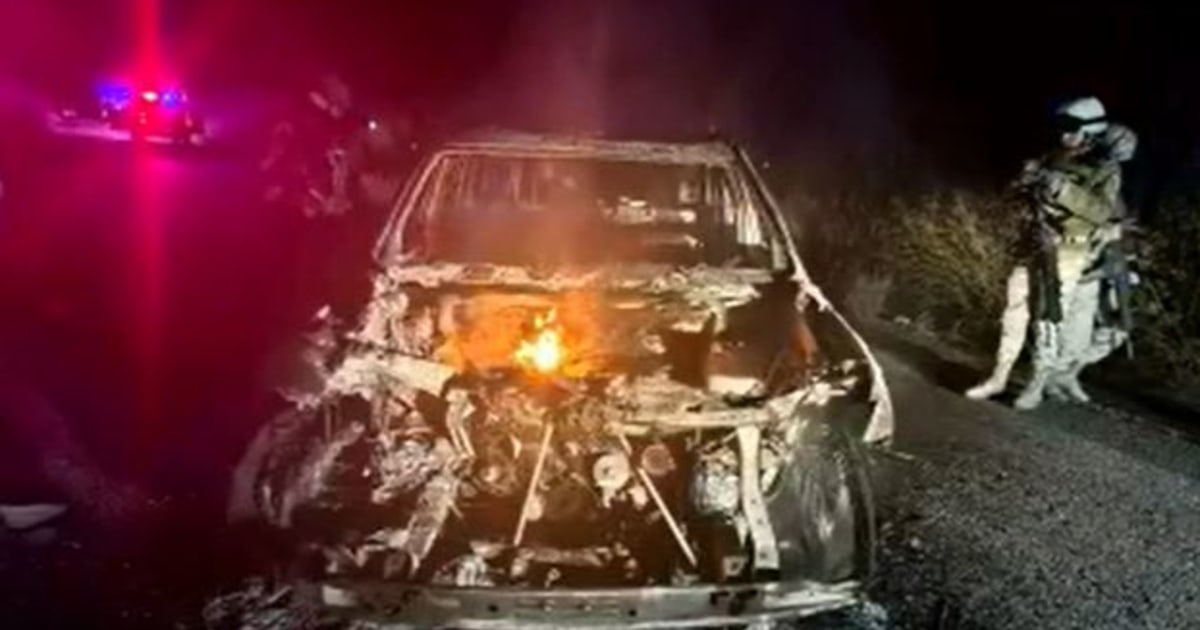Police agents guard the alleged hitman Jonathan Andrés Zuluaga, 'El Nene', arrested in May.
He has worked in Spain as a kitchen boy and cook in many restaurants or doing repair work, but the first time he killed someone he was only 13 years old. She has done waxing, painted nails in dozens of hairdressers and beauty centers, in addition to caring for children and the elderly, but her first childhood memories are those of "the drawers of the kitchen at home and the full clothes cabinets of bundles of bills ”. Raised in a family that worked for the best-known Colombian drug trafficker, Pablo Escobar, she immediately pointed out ways for the logistics of drug trafficking. He, from Vergara, grew up in Bogotá. She, from Medellín. Both have been hitmen, they have lived half their lives in Madrid,where the so-called “collection offices” - a sort of insurers with hired killers to guarantee organized crime businesses - began to be installed in the 1990s and where the police now estimate that there are dozens of them.
"Every self-respecting criminal organization has its
office
to guarantee respect for agreements, deliveries and payment of debts," say police sources.
And "every doctor - as Pablo Escobar liked to be called - must have his office."
It was the founder of the Medellín cartel who thus coined the term office, as well as many of the working methods.
“That is the origin of those crime franchises.
They landed at the hands of the Colombians who created alliances with the Galician drug traffickers, but they have established themselves due to a question of utility and efficiency, ”the same sources say.
They claim that their headquarters are Madrid ("a legal paradise to work in", in his words), but also delegations in Barcelona, Valencia and Malaga.
Half a thousand in Spain
The latest reports from the Intelligence Center against Terrorism and Organized Crime (CITCO) spoke of some 500 criminal organizations based in Spain (504 in 2019, of which 109 were exclusively dedicated to cocaine trafficking).
Reports confirmed that Spain continues to be the main gateway for drugs from South America into Europe since those same nineties.
The capital of Spain was the first city in which many of the migrants from Latin America settled, including Colombian drug traffickers and hitmen, "since it is where they find more support and better camouflage themselves," explain the police from the Central Brigade of Narcotics, specialized in the prosecution of these crimes.
"I came to Spain at 22 years old, I grew up in an environment in which killing was a way to solve things, my whole family worked for the drug traffickers," he says on the terrace of a Madrid cafeteria. The police estimate that in Colombia (51 million inhabitants) drug trafficking generates "some 200,000 direct jobs."
“I lived alone in Bogotá since I was 12 years old and I was already carrying out robberies and I had my gun,” he continues; "My mother worked from sunrise to sunset, I on the street doing 'errands', then I joined the army for two years, which was like a camp, I loved it, I worked with the strongest cartels, I was very recruiting young people and good at driving motorcycles ”, He warns. Remember that executions are traditionally carried out from a motorcycle in which one "drives" and another acts as a "gunman" and shoots the target, seconds before fleeing. "We were a family, I rose quickly because of my courage, my coldness, my absence of fear, because of all the drugs [drugs] they gave us (Rivotril, Diazepán) and because of my ambition to earn money and have the life I wanted," he recalls he, unable to add "the dead" that he carries on his back. “All of war [of the business],never women and never children ”, she specifies. He emigrated to Spain when "the war ended [the peace process of President Andrés Pastrana began, 1998-2002 and the demobilization of the United Self-Defense Forces of Colombia (AUC) with Álvaro Uribe in 2002-2006] and jobs decreased." It was 2001 and the Spanish Government was developing a broad process of regularization of immigrants, including 100,000 Colombian citizens, according to police data.000 Colombian citizens, according to police data.000 Colombian citizens, according to police data.
The collection offices that were settling in Madrid and other strategic cities of the Spanish geography began to work with guys like him. "They are made up of between six and ten individuals, they are linked to drug trafficking organizations, but they work autonomously and they usually use the covers of all kinds of businesses: bars, restaurants, hairdressers, workshops, phone booths ...", describe police sources. "Its members come from cities with drug cartels like Cali, Medellín, Palmira, Pereira," they point out. "And they are often former members of the United Self-Defense Forces of Colombia [AUC, the groups that, supported by drug traffickers, were fighting the FARC guerrillas]," the same sources detail. "And of young people from youth gangs," they add.
Another aspect that favored the establishment of these offices in Spain were the large drug seizures by the State security forces and bodies.
In August 2001, José Ramón Prado Bugallo,
Sito Miñanco
,
was arrested
when he controlled with a satellite phone the transfer of 4,500 kilos of cocaine to a fishing vessel from the
Agios Constandinos
vessel
.
And the increasingly frequent theft of merchandise by rival organizations, the so-called rollovers, also made adequate protection of both routes and transport and warehouses increasingly necessary, the police recall.
For her part, she has grown up in a man's world, her teeth came out "making caches" (places to hide drugs), and she made herself respect - in her opinion - for her "organizational capacity" and "her precision" .
"With me they knew that things would turn out well," he says in a bar in Madrid, already retired from a life with which he had "everything."
Low profile
"They seek to have a low profile, and murder (for being the most striking thing) is the last of their methods," police experts explain. To achieve the balance of the debt, or the return of the merchandise, “they exert gradual pressure: they present themselves to their victim, agree on the debt and a period of time to pay it, if he does not pay they send him a warning through his family So that you know that they have been located and threatened, they extort money from you, kidnap you, and if they finally kill her they try to make the body disappear in some way (dismemberment, burial, acid ...), corpses have been found even in the canals of Amsterdam ”, Report the same police sources.
Some 30,000 euros can be paid for a murder in Spain, compared to the 3,000 that are paid in Colombia, "but everything is regulated by the market," they point out. The deaths, while scandalous, are almost always of people who are in the business, they warn. And they remember some:
In 2009, the police arrested Jonathan Andrés Ortiz, a 24-year-old Colombian, in Barajas as the perpetrator of the murder (he fired four shots) of the Colombian mobster Leónidas Vargas, who was admitted to the 12 de Octubre hospital in Madrid.
On September 12, 2014, a 30-year-old man was killed five times by a hitman who fled on a motorcycle in Usera.
On September 24, 2015, an Irishman was shot in Mijas (Málaga) from a car.
On May 12, 2018, David Ávila Ramos, alias
Maradona
, was
killed with five shots from a motorcycle
, at the exit of his son's communion in Marbella ...
Espionage work and the law of silence
Typically, when the "office" receives an order, clients provide all the information they have about the target, according to police sources. "It is almost always simply an alias, a photograph, a relative or a landmark," they describe. At that time, the hitmen began a preliminary espionage task that mainly consists of asking their collaborators, who will receive a small reward or the favor of the "boss" and the protection of the "office". They form authentic information networks.
The commission ranges between 40% and 50% of the amount recovered. Before and after, the law of silence: a complaint from a client assumes the murder of him and his family.

/cloudfront-eu-central-1.images.arcpublishing.com/prisa/55WQTZHVKVEUTBRPZZM2NALSCY.png)


/cloudfront-eu-central-1.images.arcpublishing.com/prisa/SUWUS7YYTRADHGYXYQIRE2JO74.jpg)






/cloudfront-eu-central-1.images.arcpublishing.com/prisa/KMEYMJKESBAZBE4MRBAM4TGHIQ.jpg)


/cloudfront-eu-central-1.images.arcpublishing.com/prisa/EXJQILQR5QI7OMVRTERD7AEZAU.jpg)
